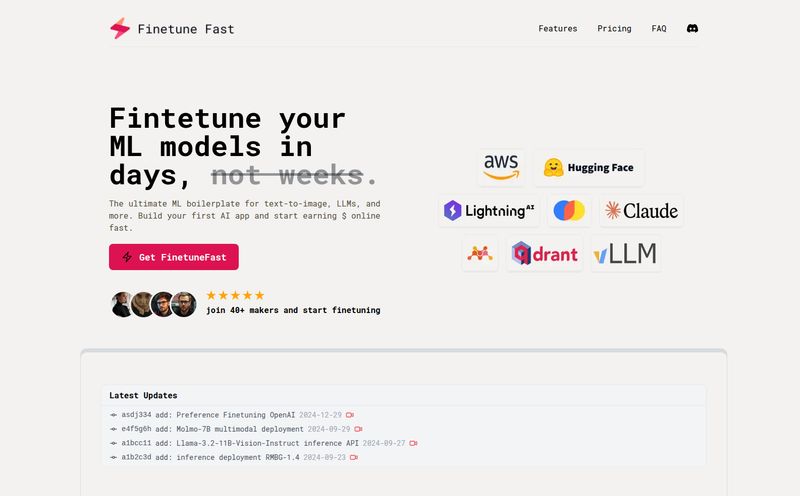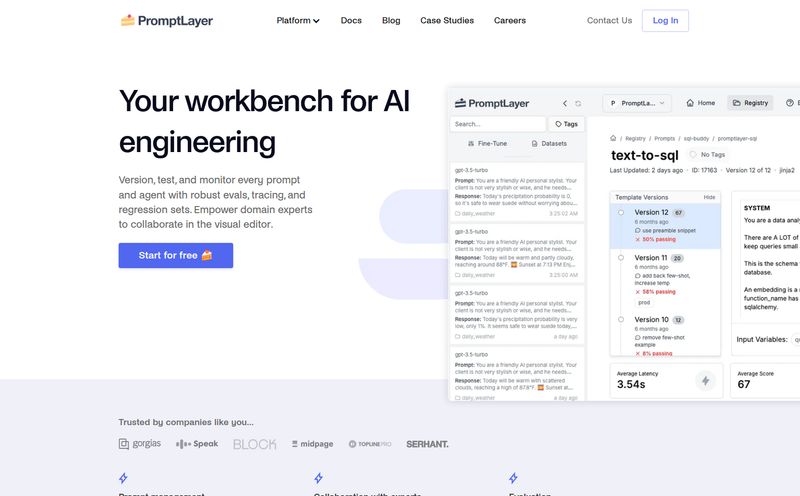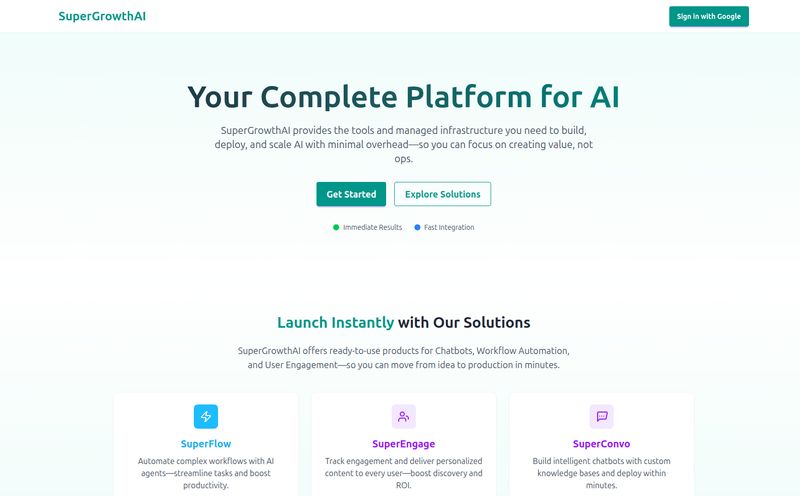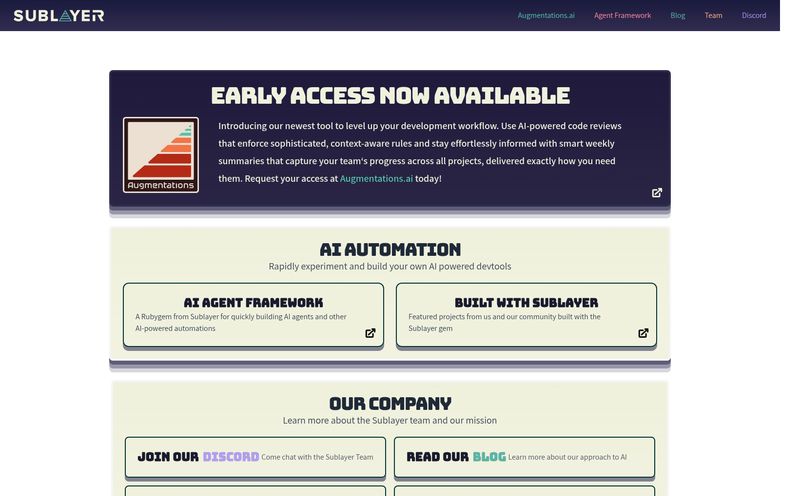Building with LLMs and AI agents feels a bit like the wild west right now, doesn't it? One day you're a hero with a demo that wows everyone. The next, you push to production and... chaos. The model starts hallucinating weird responses, performance tanks for no clear reason, and you're left digging through logs trying to figure out what on earth went wrong. It's the classic “but it worked on my machine!” problem, amplified by a thousand black boxes.
I’ve been in the trenches with traffic generation and digital tools for years, and I’ve seen this pattern before. A new tech explodes, and for a while, we're all just duct-taping solutions together. Then, the grown-up tools arrive. The platforms that bring order to the chaos. I’ve been hearing a lot of chatter about Arize AI lately, so I decided to roll up my sleeves and see if it’s the real deal or just another slick landing page.
What Even is Arize AI? Beyond the Buzzwords
So, what is Arize? At its core, it's an AI observability and evaluation platform. Think of it like a flight recorder, a performance coach, and a quality control inspector all rolled into one for your AI models. The homepage proudly states its built “by AI engineers, for AI engineers,” and you can feel that. This isn't a fluffy, high-level dashboard for executives; its' a deep, technical toolkit for the people who are actually building and maintaining these complex systems.
It’s designed to give you a clear window into how your AI apps are behaving, not just in a sterile development environment, but out in the real, messy world of production.
The Core Philosophy: Closing the Dev-to-Prod Loop
Here’s the thing that really caught my eye. Arize is obsessed with a concept they call “closing the loop between development and production.” This isn't just marketing fluff. It’s a direct solution to one of the biggest headaches in ML operations (MLOps): model drift. Your perfectly tuned model can go off the rails in production because it encounters data and user behavior it never saw during training.
Arize’s whole approach is built on capturing that real-world production data—the good, the bad, and the ugly—and making it easy to use that information to fine-tune your prompts, retrain your models, and build better evaluations. It’s about creating a data-driven cycle of continuous improvement, rather than just throwing a model over the wall and praying it works. This idea of a unified platform is, frankly, a breath of fresh air.
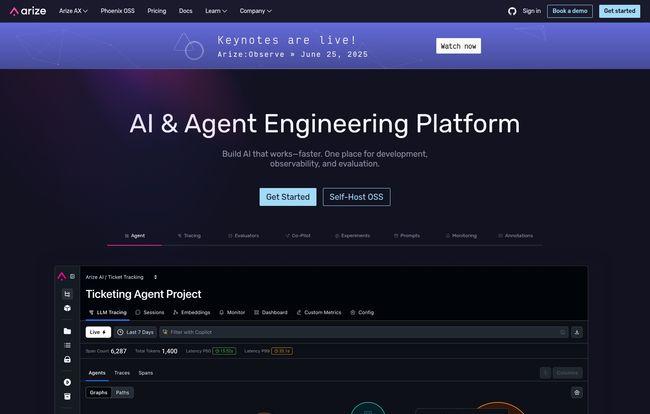
Visit Arize AI
For too long, we've had one set of tools for building and a completely different, often incompatible, set for monitoring. Arize wants to bring it all under one roof.
A Closer Look at the Arize AI Toolkit
Okay, let's get into the nitty-gritty. What do you actually get with this platform? It breaks down into a few key areas that work together.
True Observability with GenAI Tracing
If you're building anything more complex than a single API call to OpenAI, you know how quickly things can become a tangled mess. One user prompt might trigger a chain of multiple LLM calls, data lookups, and other processes. If one part fails, how do you find it?
This is where Arize’s tracing comes in. What I really appreciate is that it’s built on OpenTelemetry. This is a big deal. It means you’re not getting locked into a proprietary system. It’s an open standard for telemetry data, so you're adopting a best practice that gives you flexibility down the road. The tracing lets you visualize the entire lifecycle of a request, see every step of your agent's “thought” process, and pinpoint exactly where the latency or error occurred. It's like having a debugger for your entire AI stack.
Evaluation That Actually Means Something
How do you grade an LLM's homework? It’s not a simple pass/fail. Arize provides a whole suite of evaluation tools to tackle this. They have features for using an LLM-as-a-judge to automatically score responses on metrics like conciseness or lack of toxicity. But they also know that automated evals aren't enough. The platform includes tools for human annotation and collecting user feedback, so you can compare the automated scores with real human judgment. This is how you build a trusted evaluation dataset and stop guessing whether your model is actually getting better.
Production Monitoring for Peace of Mind
This is your early warning system. Arize’s production monitoring is designed to automatically detect anomalies. Is your model suddenly taking longer to respond? Are you seeing a spike in toxic outputs? Is a specific slice of users having a terrible experience? The platform can alert you to these issues, often before they become a full-blown fire. And with the root cause analysis tools, it doesn't just tell you something is wrong; it helps you figure out why. It might be a bad deployment, a change in user input patterns, or the dreaded data drift. Having this visibility is the difference between a minor course correction and a weekend-ruining emergency.
So, How Much Does This AI Sentry Cost?
Alright, the all-important question: what's the damage to the wallet? I was pleasantly surprised by their pricing structure. It seems well-thought-out for different scales.
| Plan | Price | Best For |
|---|---|---|
| Arize Phoenix | Free | Individuals and open-source enthusiasts who want powerful local tracing and evaluation. |
| Arize AX Free | Free | Startups and small teams wanting to try the full cloud platform with some limitations (1 user, 1 model). |
| Arize AX Pro | $50/month (for 3 users) | Growing teams that need a robust, managed observability solution without a huge enterprise contract. |
| Arize AX Enterprise | Custom | Large organizations with advanced security, scale, or self-hosting requirements. |
I love that they have a strong open-source offering with Phoenix. It builds community and lets people learn without a credit card. The AX Pro plan at $50 a month for 3 users and 2 apps feels very reasonable for a small team getting serious about their AI product. It’s an accessible entry point to professional-grade tools.
The Good, The Bad, and The Nitty-Gritty
No tool is perfect, so let’s get down to it. After digging through their docs and playing around, here’s my take.
On the plus side, having a unified platform is a massive win. The constant context-switching between different tools for tracing, eval, and monitoring is a huge productivity drain, and Arize tackles that head-on. The commitment to OpenTelemetry is another huge pro in my book—it shows they're thinking about the long-term health of the ecosystem, not just locking you in.
Now, for the potential downsides. For a small team, the jump from the Pro plan to the custom Enterprise pricing might be steep. Your CFO might raise an eyebrow when you start talking custom contracts. Also, this is a powerful tool, and with great power comes a bit of a learning curve. This isn't a plug-and-play solution for your marketing intern. You'll need some AI engineering know-how to really get the most out of the more advanced features, as it requires integration into your existing development pipeline.
My Final Verdict: Should You Use Arize AI?
So, what’s the final word? In my experience, tools like Arize are becoming less of a “nice-to-have” and more of a “how-can-you-live-without-it.” If you are an ML team at an AI-first company or any business that is putting AI at the core of its product, you absolutely need a robust observability and evaluation strategy. Flying blind is not a strategy.
Is Arize AI the one? It makes a very, very compelling case. It’s comprehensive, built on smart principles, and has a pricing model that can grow with you. If you’re a hobbyist just tinkering, the free Phoenix library is more than enough. But if you have customers, a reputation, and revenue on the line, investing in a platform like Arize seems less like a cost and more like an insurance policy for your AI’s success.
Frequently Asked Questions About Arize AI
- What is the main difference between Arize Phoenix and Arize AX?
- Arize Phoenix is a free, open-source library that you run locally on your machine for tracing and evaluation. Arize AX is their full, cloud-based platform that adds production monitoring, collaboration features, longer data retention, and enterprise-grade security. Phoenix is for individual development; AX is for team production.
- Is Arize AI suitable for small businesses?
- Yes. The Arize AX Pro plan, starting at $50 per month for 3 users, is specifically designed for smaller teams and startups that have moved beyond the initial experimentation phase and need professional tools to monitor their production AI applications.
- Do I need to be an AI expert to use Arize?
- While the platform is designed for technical users like AI and ML engineers, the dashboards and visualizations are quite intuitive. However, to get it set up and integrated into your pipelines, you will need some technical knowledge of your AI stack. It's not a no-code tool.
- How does Arize AI handle data privacy and security?
- The pricing page shows that security is a major focus. The paid plans offer compliance with standards like SOC 2 and GDPR. For companies with extremely strict data requirements, the Enterprise plan offers a self-hosted option, meaning your data never has to leave your own infrastructure.
- What is LLM observability and why is it important?
- LLM observability is the practice of monitoring and understanding the behavior of Large Language Model applications in production. It's important because LLMs can be unpredictable. Observability helps you debug errors, track performance, monitor for things like toxicity or bias, and ultimately ensure the AI is providing a reliable and high-quality experience for users.
- Can I self-host Arize AI?
- Yes, self-hosting is available on the Arize AX Enterprise plan. This is for larger companies that have specific security or data governance policies that require them to manage the application within their own cloud or on-premise environment.
